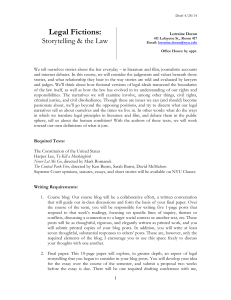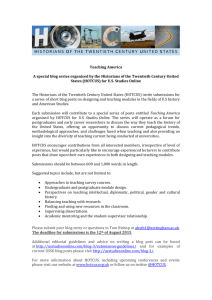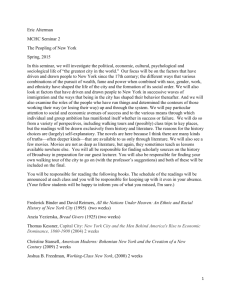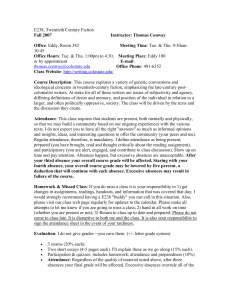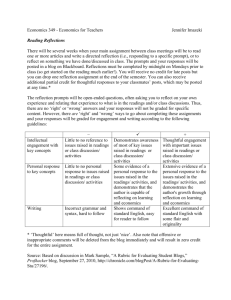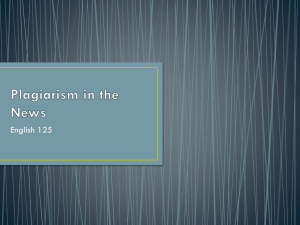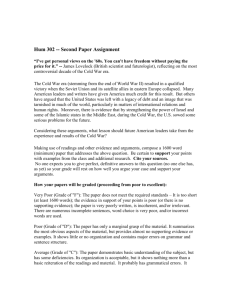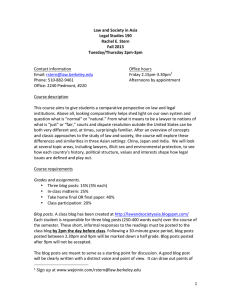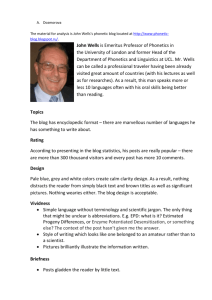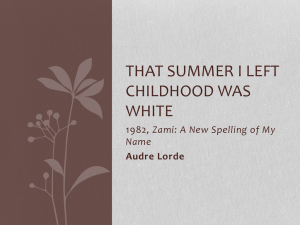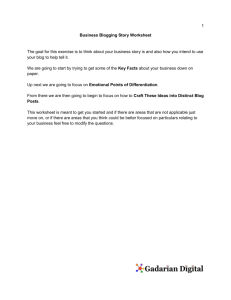Sex and Gender Roles – 5
advertisement
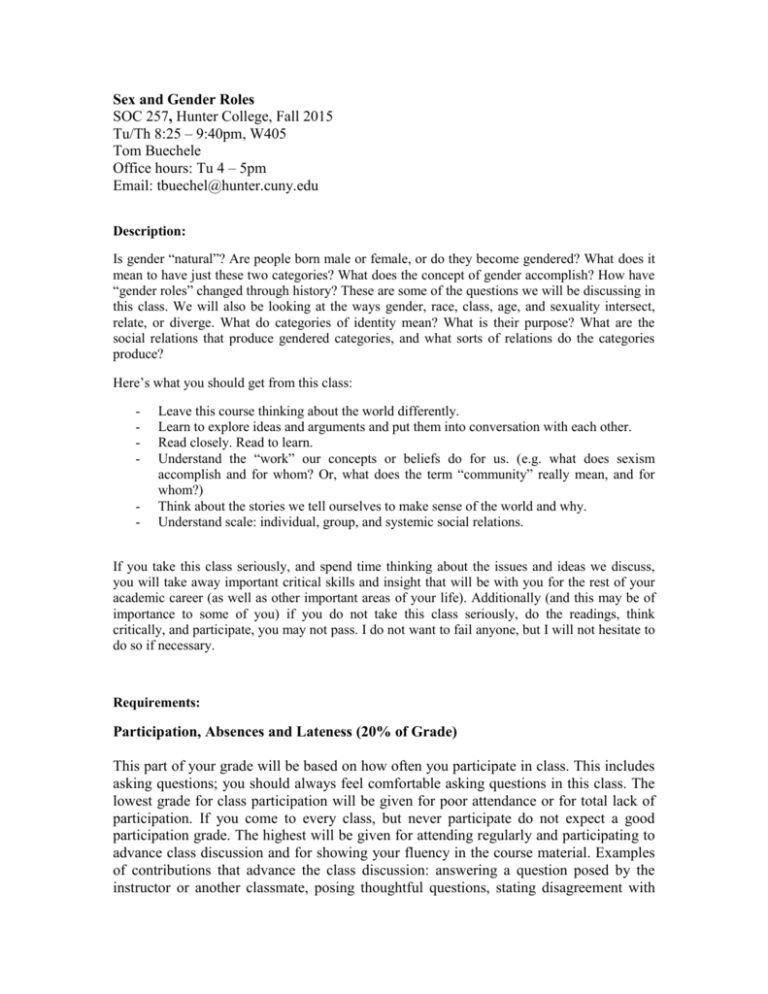
Sex and Gender Roles SOC 257, Hunter College, Fall 2015 Tu/Th 8:25 – 9:40pm, W405 Tom Buechele Office hours: Tu 4 – 5pm Email: tbuechel@hunter.cuny.edu Description: Is gender “natural”? Are people born male or female, or do they become gendered? What does it mean to have just these two categories? What does the concept of gender accomplish? How have “gender roles” changed through history? These are some of the questions we will be discussing in this class. We will also be looking at the ways gender, race, class, age, and sexuality intersect, relate, or diverge. What do categories of identity mean? What is their purpose? What are the social relations that produce gendered categories, and what sorts of relations do the categories produce? Here’s what you should get from this class: - - Leave this course thinking about the world differently. Learn to explore ideas and arguments and put them into conversation with each other. Read closely. Read to learn. Understand the “work” our concepts or beliefs do for us. (e.g. what does sexism accomplish and for whom? Or, what does the term “community” really mean, and for whom?) Think about the stories we tell ourselves to make sense of the world and why. Understand scale: individual, group, and systemic social relations. If you take this class seriously, and spend time thinking about the issues and ideas we discuss, you will take away important critical skills and insight that will be with you for the rest of your academic career (as well as other important areas of your life). Additionally (and this may be of importance to some of you) if you do not take this class seriously, do the readings, think critically, and participate, you may not pass. I do not want to fail anyone, but I will not hesitate to do so if necessary. Requirements: Participation, Absences and Lateness (20% of Grade) This part of your grade will be based on how often you participate in class. This includes asking questions; you should always feel comfortable asking questions in this class. The lowest grade for class participation will be given for poor attendance or for total lack of participation. If you come to every class, but never participate do not expect a good participation grade. The highest will be given for attending regularly and participating to advance class discussion and for showing your fluency in the course material. Examples of contributions that advance the class discussion: answering a question posed by the instructor or another classmate, posing thoughtful questions, stating disagreement with the author/other students/instructor and backing that position up with a solid argument. To participate in a thoughtful manner, you must support your opinions with textual references and/or describe relevant experiences and be open to critique and/or disagreement. In addition, please critique or disagree with others in a respectful way; belittling comments directed to any person will not be tolerated. You should also be prepared to have something to say if called on by the instructor. To fully participate in a class where the texts are instrumental to the class discussion and content, you must bring the readings to class. An additional way to earn credit toward your participation grade is to look up words in the text you did not know and share the definitions with the class. Persistent absences or lateness will result in a reduction of your final grade consistent with the policies of the university and of the department of Sociology. More than 6 absences will result in an automatic F. Forum Posts (30% of grade) The class will be put into 7 groups of about 5 each (some might have 4 or 3 and some may have more than 5 depending on final registration numbers). Each group will have its own blog where you will have a collaborative online writing portfolio. Each student will have to create her/his own wordpress.com account to access the blog. (There will be a training session on this in class). This blog will be attached to the class blog. Each week your group will write a post of at least 250 words (the equivalent of about 1 double spaced page) in response to that weeks reading/video assignments. These posts are less formal than the short essays and are meant as a way for you to reflect, ask questions, and/or post other information in relation to that week’s topic. What you can post is RELATIVELY open ended as long as it relates in some way to the topics that the texts that week covers. This is also a good opportunity for you to ask questions in response to the readings as well. For instance you my at times find these readings difficult and you can pose question to your group about the meaning of the text or specific concepts the texts are using. You should post questions at least every other week as part of this assignment. We will use these questions and posts in class to generate discussion beyond my lecturing. EVERYONE in the group most post something. These posts are due every week by Noon the day of first class of that week. Presentation: (25% of grade) In which you’ll give a 10 to 15minute presentation on one reading explaining the author’s key points, giving examples from the text, and raise at least one question for the class. A write up of your presentation is to be handed in along with your presentation. Midterm (TBA) In Class Writing/Quiz (TBA) Final (25% of grade) ABSOLUTELY NO cell phones, online chatting, etc during class. If I see you doing these things, I will consider it an absence and deduct points from your grade accordingly. Also, come to class on time. More than 15 minutes after the start of class will also be considered an absence. Incompletes policy: No incompletes will be given except in the case of family or medical emergencies. Plagiarism policy: Any student committing plagiarism will automatically fail the course. This is not negotiable. This applies to written work and oral presentations. Do not present, for example, a Wikipedia summary as your own words. Any act of plagiarism will result in academic and disciplinary sanctions through the Committee on Academic Integrity and the CUNY FacultyStudent Disciplinary Procedure. If you have ANY QUESTIONS about what plagiarism is, ASK ME. SUBJECT TO CHANGE Week 14: T Nov 24 Donna Haraway, “Cyborg Manifesto” Bob Connell, “Hegemonic masculinity”, Th Nov 26 Thanksgiving Week 15: T Dec 1 Audre Lorde, “Age, race, class and sex: women redefining difference” (Audre Lorde Documentary) Th Dec 3 Angela Davis, “Standards for a new womanhood” Week 16: Dec 8 bell hooks, “Black Women: Shaping Feminist Theory” and “Men, Comrades in the Struggle” Dec 10 Steven Gregory, “Men in paradise” FINAL TBA
